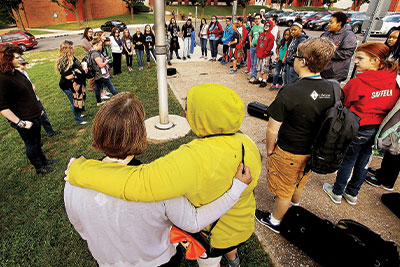Enduring Faith
“Haters of humanity,” the Romans called the early Christians, whom they infamously would sometimes throw to the lions. Much later in history, the French revolutionaries would try eliminating Christianity by, in part, creating a new calendar with 10-day weeks excluding the Lord’s Day. Mexico’s revolutionary government, beginning in 1926, instituted anti-clerical laws that prescribed the arrest of priests for wearing clerical garb in public or criticizing the government. Spain’s “Red Terror” (1936-1939) saw the execution of more than 6,800 clergy and religious people and the persecution of religious communities. The Soviets imprisoned and executed religious leaders and introduced “scientific atheism,” while the Nazis aimed to replace Christianity with neo-paganism and, as a ploy to seduce people away from the authentic faith, trumpeted what they called “Positive Christianity.” (It portrayed Jesus as a Nordic character persecuted by Jewish authorities.)
Yet there’s a notable point of history here: These Roman, French revolutionary, Mexican- and Spanish-leftist, Soviet, and Nazi persecutors are long gone.
Christianity remains.
Eternal Faith
Rome’s poets famously dubbed their metropolis the “Eternal City,” but what the persecutors among them didn’t know was that they were tangling with the eternal faith. (Or perhaps some did know — or at least did thus fear.) But all the victimizers became the vanquished and, if we could anthropomorphize these movements, we could say that they form Christianity’s blessed trail of dead bodies.
One of the many things that should give Christians hope and bring them joy is that the saying “Tell me who your friends are and I’ll tell you who you are” has a corollary: Tell me who your enemies are and I’ll tell you who you are. Christianity has never failed to make the right enemies and, related to this, has never failed. This good news about the Good News is now accompanied by bad news that often makes news, however: Failing to learn from history, partially because they don’t know it, America’s secularists have apparently chosen to become the eternal faith’s latest vanquished foe.
The attack on Christianity in America is longstanding and intensifying. “In 1987, Andres Serrano won a taxpayer-funded award for his photograph of a crucifix immersed in urine,” wrote The New American in “The War on Christianity” (April 6, 2020). “Outraged taxpaying Christians were silenced and told they didn’t have to look at it, but they had to respect the artist’s so-called right of self-expression. In 1996, Chris Ofili created a warped image entitled Holy Virgin Mary and adorned it with pornographic images and elephant dung. Then-New York Mayor Rudy Giuliani threatened to pull Brooklyn Museum funding over the exhibit, but a U.S. District Court squelched him, claiming violation of the museum’s First Amendment rights.” Of course, artists who draw the Muslim “prophet” Muhammad are attacked, sometimes violently, as happened with the 2015 shooting at the “Draw Muhammad” contest in Garland, Texas. Violence apparently works, too — when exercised by the politically privileged. Why, even Donald Trump, responding to the attack, asked rhetorically, “why are they ... drawing Muhammad? Isn’t there something else they can draw?” Yes: The conclusion that an anti-Christian double standard is at work.
Matters have only gotten worse since ’96, too. “Who can forget when A&E suspended Phil Robertson of the hit TV series Duck Dynasty in 2013 for expressing his opinion that homosexuality is a sin?” The New American continued: “Earlier that same year, Aaron and Melissa Klein, who owned a bakery in Oregon called ‘Sweet Cakes,’ refused — based on their religious convictions — to make a wedding cake for a same-sex couple. The lesbians sued ... [and for] their supposed transgressions the Kleins were fined $135,000, forcing them to shutter the bakery. Today they are still out of business and embroiled in legal appeal battles.”

They called it: In 1989, two homosexuality activists predicted that a major pro-“gay rights” realignment would ensure the silencing of those opposing their agenda. Fast-forward 24 years, and Duck Dynasty star Phil Robertson (shown) would become another one of the sexual devolutionaries’ victims — he was suspended by A&E for saying homosexuality is a sin. (AP Images)
These are just a few examples of a wider pattern and movement, mind you, that aims to put even men of the cloth out of business. As The New American also related:
Last fall [2019] the California state Assembly passed a resolution, ACR 99, pressuring clergy and educators to cease preaching against “lesbian, gay, bisexual or transgender (LGBT)” lifestyles and discouraging them from engaging in conversion therapy, a term that refers to biblical counsel for people struggling with same-sex attraction. Though the resolution has no force of law, the next logical step would be for California to enact punitive measures for non-compliance. “It is the goal of ACR 99 to eventually criminalize one’s choice to seek counseling and other services,” reads a Capitol Resource Institute analysis of the bill.
... Even more disturbing is what’s happening in classrooms across the country since the National Education Association (NEA) partnered with the radical pro-sodomy group “Human Rights Campaign” to create “welcoming schools” and force teachers to play along with their students’ supposed “gender” confusion. Writing for The New American, Alex Newman relates stories of teachers such as Peter Vlaming at West Point High School in Virginia, who “have already been fired … for refusing to refer to girls using male pronouns, and vice-versa.” A middle-school physical education teacher in Florida, Rob Oppedisano, nearly lost his job and teaching certificate when he resisted school administration for allowing a girl (who “identifies” as a boy) to change clothes and shower in the boys’ locker room.
While there’s more than one motivation behind this sexual devolutionary agenda, as an attack on Christianity it’s exceptionally clever. Just consider what homosexuality activists Hunter Madsen and Marshall Kirk predicted in their book After the Ball: How America Will Conquer Its Fear and Hatred of Gays in the 90’s. If they can “produce a major realignment solidly in favour of gay rights,” they wrote, “the intransigents (like the racists of twenty years ago) will eventually be effectively silenced by both law and polite society.”
America Today
This has come to pass, too. Even the most “conservative” commentators now balk at criticizing homosexual behavior, and, more to the point, it’s not unusual hearing about young people who, alluding to sexual devolutionary concerns, say they’re leaving the church because it’s “intolerant.” This agenda is devilishly effective because authentic Christianity cannot approve of homosexuality. This not only would be a violation of the human-sexuality model God established for man, but would collapse that model. After all, what’s the church going to say? Entertaining impure thoughts is a sin, viewing porn is a sin, self-gratification is a sin, fornication is a sin, adultery is a sin, cohabitation is a sin, but homosexuality is — what? A lifestyle choice, like living on a houseboat? It would be a “What’s wrong with this picture?” situation, akin to making it legal to keep a tiger as a pet, but not a hamster, parakeet, or buff tabby. It would rob the teachings of all seriousness and credibility. So the marketing-of-homosexuality strategy puts Christianity between a rock and a hard place (even as it moves people from the Rock toward a hot place): The church can lose some adherents or, in an effort to keep them, lose its soul. That is to say, the religio-social engineers will counter that the solution is simple: a great religious reset, a re-imagining of Christianity and the Bible that allows for sexual devolutionary priorities. Some “versions” of “Christianity” have already made this transition, they may say. Yet this is just as with the Nazis’ aforementioned “Positive Christianity”: Once you change the substance of what you are and all that remains is (perhaps) the style, you’ve already been destroyed, reduced to a mere husk. It truly is amazing what man will sacrifice in the name of sex.
Yet the attacks on Christianity take many forms. As The New American also reported in the aforementioned essay, “We could add Montana’s refusal to allow religious schools access to its state scholarship program; the new law in New York that forces pro-life groups to hire pro-abortion employees; the Virginia realtor persecuted by her state’s Real Estate Board for using Christian references in digital communication; the Pennsylvania National Guard Unit that tried to ban a Christian scouting group from touring its facility; the Florida soup kitchen told to remove Christian banners and stop giving out Bibles or risk losing USDA funding; two ministers arrested for reading the Bible aloud on the sidewalk outside a Hemet, California, DMV; and the city of San Francisco’s recent commercial blacklist of 22 states with strong pro-life laws. And this list is only the tip of the iceberg; many more examples could be added.”

Fully constitutional: Secularists might claim that school prayer gatherings, such as the above, are unconstitutional. But that the first Congress opened with prayer in 1789 reflects the truth: The First Amendment dictates that the federal government must stay out of religion — not that religion must stay out of government. (AP Images)
There are, however, yet other attacks on Christianity, ones sometimes so subtle they wouldn’t generally even be regarded as attacks. Consider, for instance, the presentation of godless evolution as fact in our schools, entertainment, and media. Its atheological implications were addressed well by, believe it or not, an atheist — New York University law and philosophy professor Thomas Nagel. In his essay “Public Education and Intelligent Design,” Nagel wrote:
From the beginning it has been commonplace to present the theory of evolution by random mutation and natural selection as an alternative to intentional design as an explanation of the functional organization of living organisms. The evidence for the theory is supposed to be evidence for the absence of purpose in the causation of the development of life-forms on this planet. It is not just the theory that life evolved over billions of years, and that all species are descended from a common ancestor. Its defining element is the claim that all this happened as the result of the appearance of random and purposeless mutations in the genetic material followed by natural selection due to the resulting heritable variations in reproductive fitness. It displaces design by proposing an alternative.
Of course, displacing design displaces the designer. This isn’t to say that this must be an inevitable result of teaching evolution. It’s not the case if it’s allowed that the process could be a divinely authored one, a vehicle through which God increased life’s complexity or a description of that endeavor’s mechanics. In practice, however, evolution is presented and taught as a corollary of atheism. It is the atheology of the atheological.
Alienation
This is all very worldly — but then there’s the other-worldly. “In 2014, [NASA] awarded $1.1M to the Center for Theological Inquiry, an ecumenical research institute in New Jersey, to study ‘the societal implications of astrobiology,’” wrote the BBC in 2016. The reason for this is simple: The implications of the search for extraterrestrial life “extend well beyond biology and physics, reaching to the humanities and philosophy and even theology,” the BBC later stated. “As Carl Sagan has pointed out in (the now out-of-print book) The Cosmic Question, ‘space exploration leads directly to religious and philosophical questions.’ We would need to consider whether our faiths could accommodate these new beings — or if it should shake our beliefs to the core.” What’s more, it’s not that we’ll only be confronted with this if E.T. shows up in Times Square, as a 2021 Pew Research study found that 65 percent of Americans already believe intelligent alien life exists on other planets.
The BBC addresses how this can affect people’s thinking. The outlet quotes Sagan as having said about the results of astrobiological study, “We find that we live on an insignificant planet of a humdrum star lost in a galaxy tucked away in some forgotten corner of a universe in which there are far more galaxies than people.” “But how could a believer reconcile this with their faith that humans are the crowning achievement of God’s creation?” the BBC then asks. “How could humans believe they were the apple of their creator’s eye if their planet was just one of billions?”
The BBC answers this question, writing that “we don’t reserve the word ‘special’ only for unrepeatable, unique, isolated phenomena.” The “discovery of life elsewhere in the Universe would not compromise God’s love for Earth life, ‘just as a parent’s love for a child is not compromised because that child has a brother or sister,’” the outlet continues, quoting Ted Peters, professor emeritus in theology at Pacific Lutheran Theological Seminary.
In point of fact, however, alien-fixation has become a religion for many Americans, perhaps understandably. Extraterrestrials certainly are a titillating topic, and some people believe their existence would explain much. These adherents may put these theoretical aliens in the place of God (though they’d be not even a pale imitation). They’d be superior beings, the theory goes, intellectually, technologically, and morally. This astro-theology provides hope, too, with many entertaining the idea that at the eleventh hour, maybe when we’re at our most desperate, these extraordinary extraterrestrials would descend from the heavens, intercede, and save us from whatever hell on Earth we’ve authored, be it “climate change,” nuclear war, or Covid on Steroids (or Donald Trump!).
Telling these believers theirs is a vain hope is surely in vain, but the deeper point is this: Inventing an alien-based creation and salvation story merely kicks the theological can down the road. It explains none of the biggest questions. For these aliens would just be material beings, like ourselves. Where would they have come from? What is the meaning and purpose of life? What happens after death? Is there an objective basis for “morality,” or is it just another “social construct”? If the latter, then occultist Aleister Crowley was right: “Do what thou wilt shall be the whole of the law.”
If extraterrestrials did exist, they would be God’s creatures as well. And if they landed on our planet, wouldn’t it shock the astro-theologians if upon exiting their craft their first words were, “Have you heard about Jesus?”
The Greatest Lie Ever Told
Yet what may be most destructive to faith isn’t anything as titillating as little green men with Darth Vader’s technology, but something truly reflecting what author Hannah Arendt called “the banality of evil.”
There have been in recent years numerous lamentations about evangelical youth leaving the faith; their exit no doubt explains why white evangelicals have shrunk from 23 percent of our population in 2006 to just 14 percent today, according to the Public Religion Research Institute’s 2020 Census on American Religion. Mainline Protestant denominations have likely fared even worse, which is why a 2018 Pew Research Center survey found that America’s pagans now actually outnumber her Presbyterians. Observers have propounded numerous theories to explain this, with entertainment, school propaganda, peer pressure, and other obvious factors implicated. Yet what’s perhaps the most significant cause virtually always escapes scrutiny.
I often cite a Barna Group study finding that, in 2002 already, only six percent of teenagers believed in Truth (objective by definition) and that they were most likely to make “moral” decisions based on feelings. Strikingly, the percentage of “born again” youth who suppose likewise was only nine percent. Barna, in partnership with the Impact 360 Institute, found similar results via 2020 research. As Impact 360 official Jonathan Morrow put it, the “simple fact of the matter is, moral relativism hasn’t just crept into the worldview of Gen Z — it is now the majority opinion.”
How is this relevant? Moral relativism holds that what we call “morality” is determined by man; what this actually means, however, is that morality (properly defined) doesn’t really exist — only man’s preference does. This strikes at Christianity’s very heart because it renders the sacrifice on the cross incomprehensible. After all, if there’s no Truth and all is preference, there is no sin. If there’s no sin, there was no reason for Jesus to die for us. This means there is no need for salvation and, hence, no need for Christianity.
So given the relativism the young have been marinated in, their departure from faith is entirely rational. Why, if I believed all was preference, just a flavor of the day, would I constrain my impulses with the Christian moral standard or any other? I should rather be a hedonist.
Unfortunately, many “churches” are relativism-ridden themselves, which is why they’re often more concerned with “social justice” than salvation (so-called “leftism” cannot exist in a universe in which Truth is recognized and sought). Even in those not thus afflicted, clergy are virtually never heard addressing the relativism-vs.-Truth matter. This makes them poor physicians who fail in diagnosis and prescription, as they don’t tackle our time’s characteristic philosophical disorder: the greatest lie ever told — that there is no Truth.
The Greatest News Ever Delivered
But then there’s the greatest news ever delivered: There is Truth! Christian apologists are longstanding and legion, and some critics may wonder why the faith must always be defended. The naysaying nonbeliever has his answer: Christianity is bad, or, as the very literate late “anti-theist” Christopher Hitchens put it, “Religion poisons everything.” But the reality is quite different.
“You cannot evade the issue of God,” wrote philosopher G.K. Chesterton in London’s Daily News in 1903. “Things can be irrelevant to the proposition that Christianity is false, but nothing can be irrelevant to the proposition that Christianity is true.” You see, Christianity is Truth and, as American Chesterton Society president Dale Ahlquist noted commenting on this, “Truth touches everything, which is exactly why it is attacked from all sides.”
So it has been, is now, and so it shall be. Yet as the Romans and Nazis and every Christophobic barbarian between and since has learned, to set yourself in unrelenting opposition to Christianity is to lose your civilization, perhaps only shortly after you lose your mind. Yes, the faith is waning currently in the United States, with self-identified Christians shrinking from 91 percent of the population in 1948 to 77 percent in 2009 to 64 percent today, a death spiral showing no sign of abating. Yet this has happened before, as Chesterton pointed out in The Everlasting Man, one of history’s truly great books. In the chapter “The Five Deaths of the Faith,” he wrote:
I have said that Asia and the ancient world had an air of being too old to die. Christendom has had the very opposite fate. Christendom has had a series of revolutions and in each one of them Christianity has died. Christianity has died many times and risen again; for it had a god who knew the way out of the grave. But the first extraordinary fact which marks this history is this: that Europe has been turned upside down over and over again; and that at the end of each of these revolutions the same religion has again been found on top.
... At least five times ... with the Arian and the Albigensian, with the Humanist sceptic, after Voltaire and after Darwin, the Faith has to all appearance gone to the dogs. In each of these five cases it was the dog that died.
Every dog has his day, too, the saying goes, and our current sexual heretics and simpleton secularists are having theirs. But as we wait for the next spiritual rebirth, and suffer political setbacks and cultural degradation in the interim, we should appreciate that while might doesn’t actually make right, right does make might. There are blessings and beauty in seeing Truth in a sea of doubters, in being sane in a land gone mad, in having reason for hope in a time of despair, in knowing why Chesterton stated “A man is tallest when he kneels.”
Jesus said in Matthew, “Blessed are you when people insult you and persecute you, and falsely say all kinds of evil against you because of Me. Rejoice and be glad, for your reward in heaven is great.” For sure, there certainly is something far worse than being under the thumb of anti-Christian persecutors: being one of them.



